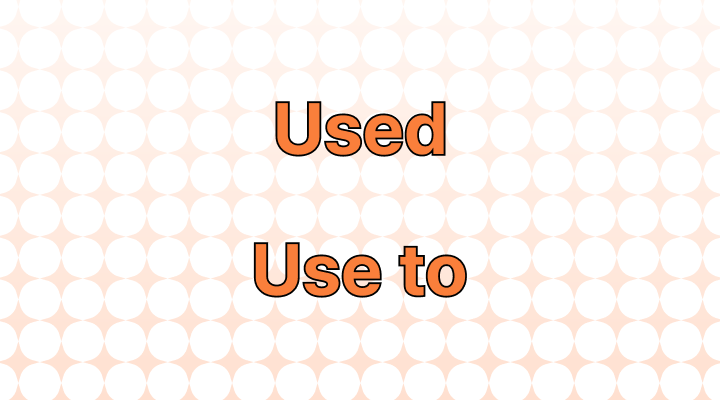Used to is the correct form when discussing past habits or situations that have changed, while use to without the "d" is incorrect in standard English usage.
When is used to used?
Used to is a phrase that is used to describe actions, habits, or states that were regular or habitual in the past but are no longer so. It is often employed when discussing something that was true or common in the past but has changed over time.
Example sentence
- I used to live in New York.
This means that at some point in the past, the person lived in New York, but they no longer do.
- She used to play the piano when she was a child.
In this case, the individual played the piano regularly as a child, but that habit has ceased.
More example sentences
- I used to play the piano when I was a child, but I haven't touched it in years.
- They used to go on annual family vacations to the beach, but now they prefer mountain getaways.
- He used to be a heavy smoker, but he quit smoking five years ago.
- My grandmother used to knit sweaters for all the grandchildren during the winter months.
- We used to walk to school together every day when we were in elementary school.
- She used to speak fluent French when she lived in Paris, but she's a bit rusty now.
- The company used to operate out of a small office, but they've since expanded to multiple locations.
- I used to eat fast food regularly, but I've switched to a healthier diet recently.
- They used to have a big garden in their backyard where they grew vegetables, but now it's just a lawn.
- When I was a teenager, I used to stay up late reading books under my blanket with a flashlight.
How do we use use to?
Use to is not a phrase used on its own. Instead, it is part of a structure that combines "use" (the base form of the verb) with "to" (an infinitive marker) and is used to express the idea of a purpose or function.
Example sentence
- I use this pen to write.
Here, "use to" signifies the purpose of the pen, which is for writing.
Common idioms/phrases
The phrases "used to" and "use to" are commonly used in English to express habits, actions, or situations that were habitual or regular in the past but are no longer the case. Here are some common idiomatic expressions and phrases that use "used to" or "use to":
- Used to the daily grind: This phrase describes someone who is familiar with and accustomed to the routine or daily work tasks, often implying a sense of monotony.
- Used to the finer things in life: This expression refers to someone who is accustomed to a luxurious or high-quality lifestyle.
- Used to the old ways: This idiom describes someone who prefers traditional or familiar methods, often resisting change or modernization.
- Use to someone's advantage: This phrase means to employ something to benefit oneself. For example, "She knew how to use her charm to her advantage."
- Used to be the case: This expression is used to indicate that something was true or happened in the past but is no longer true or applicable.
- Use to the fullest: This idiom suggests making the most of a situation, opportunity, or resource. For instance, "She always uses her time to the fullest."
- Used to one's own devices: This phrase means allowing someone to act independently or without interference. For example, "He was left to his own devices to solve the problem."
- Use to the best of one's ability: This expression indicates making the most of one's skills, talents, or resources. For instance, "He used his knowledge to the best of his ability to solve the puzzle."
- Used to the idea: This idiom is used when someone becomes accustomed to or accepts a new concept or situation over time. For example, "I've become used to the idea of moving to a new city."
- Use to one's advantage: This phrase means to exploit or make the best use of a situation, often for personal gain. For example, "He used his connections to his advantage in the business world."
These idiomatic expressions and phrases demonstrate the flexibility and versatility of "used to" and "use to" in conveying various meanings related to past habits, adaptability, and the utilization of resources or circumstances.
To differentiate between these two phrases, remember that "used to" is used to talk about past habits or actions that are no longer ongoing, while "use to" is used to express the purpose or function of something in the present. Understanding this distinction is crucial for using the correct phrase and conveying your intended meaning accurately in written and spoken communication.
Discover more about the AI English proofreader, Engram!

Reference














